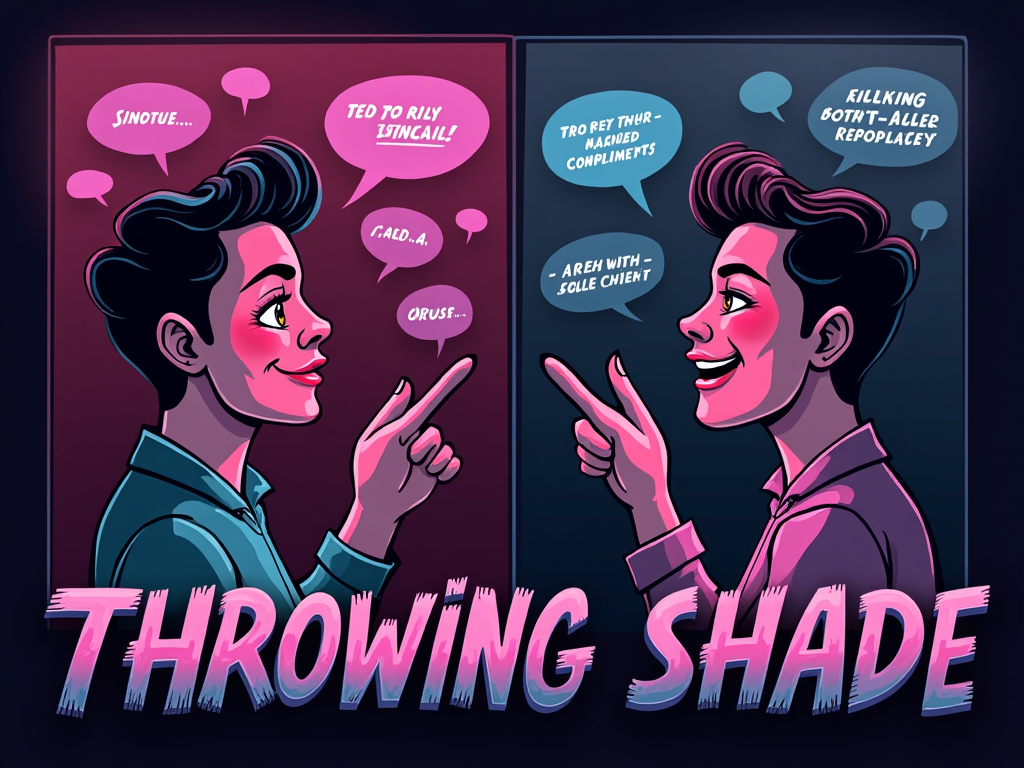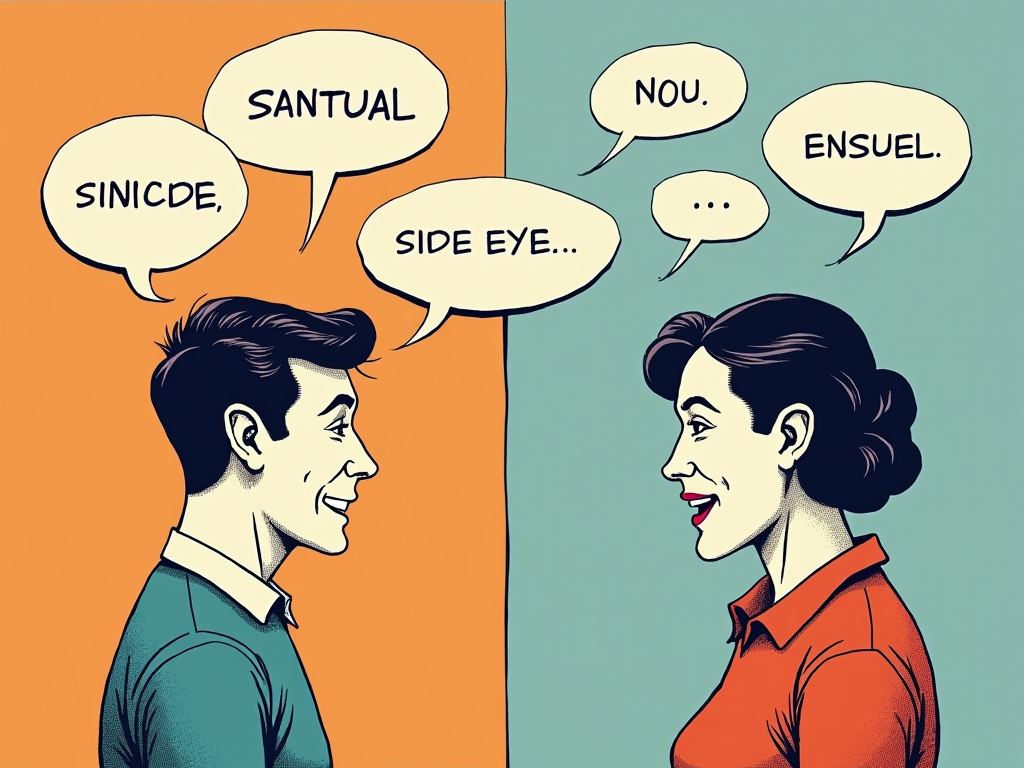Unpacking The **Subliminal Shade Meaning**: What Lies Beneath The Surface?
Have you ever felt a subtle sting from someone's words, a quiet jab that you couldn't quite place? Perhaps it felt like a hidden message, a slight beneath the surface of what was actually said. This feeling, this experience of sensing an unspoken jab, often points to something called "subliminal shade." It's a fascinating idea, actually, how words can carry more than their obvious sense. People sometimes use these kinds of messages without even realizing the impact they have, or so it seems. It's a common thing, too, in many everyday conversations and even in wider communication like advertising, you know?
The term "subliminal" itself, as a matter of fact, comes from the Latin word "limen," which stands for "threshold." So, when something is "subliminal," it exists just below that threshold of your conscious awareness. It's like a whisper you almost hear, or a fleeting image you barely catch. This means that a subliminal message isn't something your conscious mind recognizes or fully understands, but it can still have an influence on you, which is pretty interesting, really. It’s a bit like how a familiar smell can bring back a memory without you even thinking about why.
When we add "shade" to "subliminal," we're talking about a very specific kind of hidden influence. "Shade" in this context refers to a subtle insult, a quiet put-down, or a sly criticism that isn't openly stated. It's not a direct confrontation, but rather a more indirect way of expressing disapproval or making someone feel less important. Combining these two concepts, "subliminal shade" means those understated, often unnoticed, yet impactful criticisms or negative remarks that operate below the level of immediate, obvious understanding. It's a very human way, you know, of communicating without really communicating openly.
Table of Contents
- What is Subliminal Shade?
- How Subliminal Shade Operates
- Recognizing and Responding to Subliminal Shade
- Frequently Asked Questions About Subliminal Shade
What is Subliminal Shade?
The idea of "subliminal shade" brings together two rather distinct concepts into a single, potent idea. It describes those quiet, almost imperceptible digs or put-downs that seem to bypass our immediate conscious thought, yet still leave a mark. It's not about an obvious fight or a direct challenge; instead, it's about a more subtle, sometimes even unintentional, way of expressing negativity. This kind of communication, you know, can be quite tricky to pinpoint.
The Roots of Subliminal Influence
To truly grasp "subliminal shade," it helps to first understand the idea of "subliminal" itself. As we mentioned, "subliminal" means existing or operating below the threshold of conscious awareness. This means that something subliminal is not recognized or understood by your conscious mind, but it can still have an influence on it, which is pretty interesting, if you think about it. For example, a classic instance of a subliminal message, it's often said, is "eat popcorn" flashed very quickly on a screen, too fast to consciously read, but perhaps enough to influence a snack choice.
These kinds of stimuli are insufficiently intense to produce a discrete sensation that you'd notice right away, but they are often still able to evoke a response. It’s a bit like how certain colors can have a profound, though often subliminal, influence on our senses and moods. For some people, these subliminal messages are almost synonymous with mind control, a form of insidious mental manipulation designed to alter behavior, so they say. However, in reality, their influence is typically much more subtle and less direct, just a little nudge rather than a complete takeover, you know?
Understanding "Shade" in Communication
Now, let's consider the "shade" part of "subliminal shade." In everyday language, "throwing shade" means to subtly disrespect or criticize someone. It's a way of showing disapproval without being outright rude or confrontational. This can happen through a quiet eye-roll, a dismissive wave of the hand, or a backhanded compliment that sounds nice on the surface but carries a hidden barb. It’s a very common thing, too, in social interactions, especially when people want to express displeasure without causing a direct scene, you know? It's a way to express something without really saying it.
The key aspect of "shade" is its indirectness. It relies on the receiver picking up on the implied meaning rather than the explicit words. This can make it hard to call out, because the person giving the shade can always deny any negative intent, saying something like, "Oh, I didn't mean it that way!" This is why, in a way, it's such a tricky form of communication. It puts the burden of interpretation, you see, on the person receiving the message, making them question their own perceptions, which is quite a thing to do.
How Subliminal Shade Operates
When "subliminal" and "shade" combine, they create a form of communication that is both powerful and elusive. It operates by tapping into our unconscious mind, sending signals that we might not consciously register, but which still affect our feelings or perceptions. It’s a bit like background noise that you don't really hear until it stops, but it was still there, influencing your focus. This subtle influence can be quite effective, too, because it bypasses our usual defenses against overt criticism, you know?
The Psychology Behind It
The effectiveness of subliminal shade rests on the idea that our minds process information on multiple levels. While our conscious mind is busy with immediate thoughts and tasks, our unconscious mind is constantly taking in vast amounts of data from our surroundings. This includes subtle cues, non-verbal signals, and even words that are delivered in a particular tone or context. These influences or messages affect your mind without you being aware of it, which is, honestly, a little unsettling for some people, I guess.
When someone delivers subliminal shade, they are often relying on these unconscious processes. They might use a particular tone of voice, a fleeting facial expression, or a seemingly innocent choice of words that, when put together, create a negative impression without explicitly stating it. For instance, a person might say, "Oh, that's an interesting outfit choice for today," with a slight pause or a barely perceptible lift of an eyebrow. On the surface, it's a comment about clothing, but the delivery suggests a deeper, critical meaning, which is pretty clever, actually. It's a way of planting a seed of doubt without directly saying anything negative, you know?
Because these messages exist below the threshold of conscious perception, you probably will never even notice them directly. This makes it hard to challenge them, because there's no clear statement to object to. If you're worried about such things, there's not much you can do if you don't even notice it, because "subliminal" literally means "below the threshold" or surface of your conscious mind. This can lead to a feeling of unease or confusion, where you know something feels off, but you can't quite put your finger on why, which is, honestly, a rather frustrating experience for many.
Common Places You Might Find It
Subliminal shade can appear in many different parts of our daily lives, from personal interactions to wider media. In friendships or family settings, it might come out as a backhanded compliment, like "You look so good for someone who never exercises!" This comment, on the surface, seems positive, but it carries an implied criticism about one's fitness habits, which is a bit sneaky, really. Or, a person might offer unsolicited "advice" that subtly highlights a perceived flaw, you know, without being asked.
In the workplace, subliminal shade might show up in passive-aggressive emails or comments during meetings. Someone might say, "It's great to see you finally finishing that project," implying that you were slow to begin with. Or, a colleague might consistently "forget" to include you in important email chains, which is a very subtle way of signaling exclusion without a direct confrontation. These kinds of actions, you see, chip away at morale and create an uncomfortable atmosphere, all without anyone ever saying anything overtly mean, which is pretty tough to deal with, actually.
Even in media, like advertisements or political campaigns, there can be elements of subliminal shade. While direct subliminal messages like the "eat popcorn" example are highly debated and often regulated, the broader concept of subtle influence remains. An advertisement might subtly suggest that a competitor's product is inferior without ever naming it directly, using vague language or imagery that hints at shortcomings. This is a very common technique, you know, to shape public opinion without being too obvious, which is something to think about.
Recognizing and Responding to Subliminal Shade
Since subliminal shade operates below conscious awareness, recognizing it can be quite a challenge. However, becoming more attuned to your feelings and the subtle cues in interactions can help you spot it. It's not about becoming paranoid, but rather about developing a better sense of what's truly being communicated, which is a pretty useful skill, actually. Being able to see these hidden layers can help you protect yourself from their negative impact, you know?
Signs It Might Be Happening
One of the clearest signs that you might be experiencing subliminal shade is a persistent feeling of unease or confusion after an interaction, even if you can't pinpoint why. You might feel slightly insulted, or put down, but when you try to recall the exact words, they seem innocent enough. This mismatch between your emotional response and the literal meaning of the words is a strong indicator. It's like a quiet alarm bell ringing in your head, you know, even if you can't see the fire.
Other signs include subtle non-verbal cues from the other person: a quick smirk, a dismissive hand gesture, or a prolonged eye-roll that happens just at the edge of your vision. The tone of voice can also be a big clue; a saccharine sweet tone delivering a barbed comment, or a sarcastic inflection where none seems appropriate. These small details, when taken together, can form a pattern that points to an underlying negative message. It's a bit like piecing together a puzzle, you see, from very small and scattered bits of information.
Also, pay attention to repeated patterns of behavior. If someone consistently makes comments that leave you feeling slightly diminished, even if each individual comment seems harmless, that's a significant sign. It's not just a one-off thing, but rather a recurring theme in their communication with you. This consistency, in a way, makes the subliminal message stronger, as it reinforces the underlying negative sentiment over time, which is pretty impactful, really.
Ways to Handle It
Responding to subliminal shade can be tricky because of its indirect nature. Directly confronting it might lead the other person to deny any ill intent, making you feel overly sensitive. However, ignoring it entirely can allow the negative influence to persist and chip away at your confidence. So, you know, it's about finding a balance, which is sometimes quite hard to do.
One approach is to simply acknowledge the literal words, but not the implied shade. For instance, if someone says, "You look so refreshed, did you finally get some sleep?" with a hint of an insult about your usual appearance, you could simply respond, "Yes, I had a good night's rest, thank you!" This way, you don't engage with the underlying criticism, but you also don't let it go completely unnoticed. It's a subtle way of deflecting, you see, without causing a big scene.
Another strategy is to ask for clarification in a very neutral tone. If someone says something that feels like shade, you could ask, "Could you explain what you mean by that?" or "I'm not sure I understand what you're implying." This forces the person to either articulate their negative message (which they usually don't want to do) or to backtrack and clarify their words in a more innocent way. This puts the ball back in their court, so to speak, and makes them responsible for their communication, which is pretty effective, actually.
Sometimes, the best response is no response at all, especially if the shade is minor and infrequent. If you consistently receive subliminal shade from a particular person, it might be worth considering the nature of that relationship and whether it's truly supportive. Protecting your own mental well-being is very important, you know, and sometimes that means creating distance from sources of consistent, subtle negativity. It's about recognizing your own worth and not letting others diminish it, even in quiet ways.
Frequently Asked Questions About Subliminal Shade
Many people have questions about how these hidden messages work and what their real impact might be. It’s a topic that, honestly, can feel a bit mysterious to some, you know?
Can subliminal shade really affect my mood or behavior?
Yes, it actually can, in a way. While it might not force you to do something against your will, subliminal influences, including shade, can affect your mind without you being fully aware of it. These subtle messages can contribute to feelings of unease, self-doubt, or even irritation over time, you know? It’s like a slow drip that eventually fills a bucket, subtly changing your emotional state.
Is subliminal shade the same as passive aggression?
They are very similar, yes, and often overlap, actually. Passive aggression is a broader term for expressing negative feelings indirectly, which can include things like procrastination or stubbornness. Subliminal shade is a specific type of passive aggression that relies on messages or cues that operate below the threshold of conscious awareness, making them even harder to pinpoint. So, you see, subliminal shade is a kind of passive aggression, but not all passive aggression is subliminal shade.
How can I protect myself from subliminal messages?
Since subliminal messages exist below the threshold of conscious perception, you probably will never even notice them directly. However, you can become more aware of your own emotional responses and trust your gut feelings when something feels off. If you consistently feel uneasy or diminished after interacting with someone, it's worth exploring why, even if you can't point to a specific insult. Developing strong self-awareness, you know, is your best defense against any kind of subtle manipulation, which is a pretty powerful tool to have.
Understanding "subliminal shade" is about becoming more attuned to the quiet currents of human interaction. It's about recognizing that communication is more than just the words we speak; it's also about the unspoken cues, the hidden meanings, and the subtle influences that shape our perceptions. By learning to spot these understated jabs, you can better protect your emotional well-being and engage in more honest, straightforward conversations. This awareness, you know, can really make a difference in how you experience the world and your relationships. Learn more about communication dynamics on our site, and link to this page for further insights into human behavior.
For more general information on the concept of subliminal perception, you might find resources from psychology and communication studies helpful, for instance, a university psychology department's online library, as they often have detailed explanations of such concepts. Such academic sources typically provide a solid foundation for understanding how our minds process information, even when we're not fully aware of it, which is pretty fascinating, really. They can explain how, say, the latin word limen means threshold, and how something subliminal exists just below that threshold of conscious awareness, giving a fuller picture of the idea, you know?

Throwing Shade » Decode Internet Slang » SLANGINFO.com

Throwing Shade » Decode Internet Slang » SLANGINFO.com

Shade Meaning » Slang.org